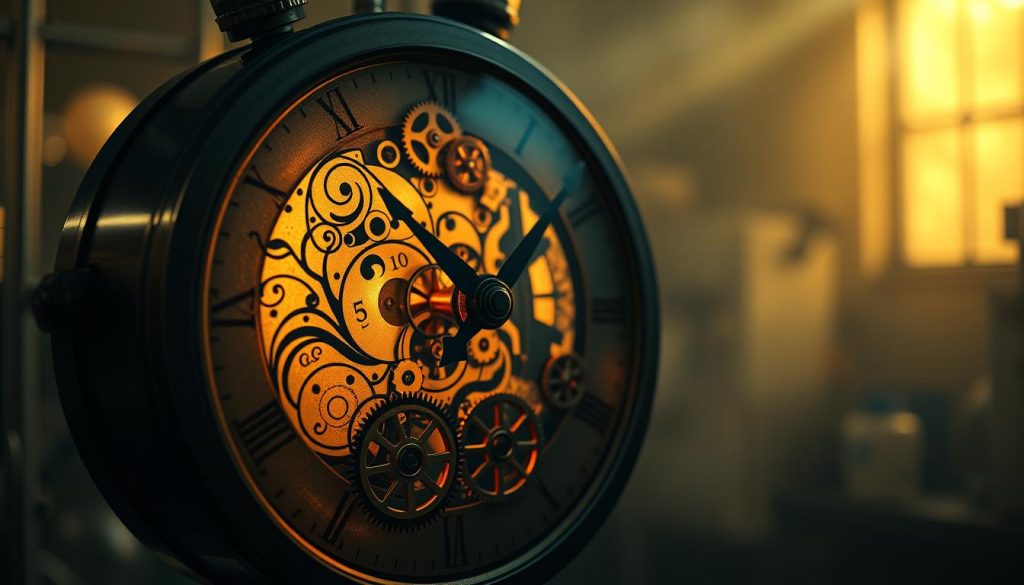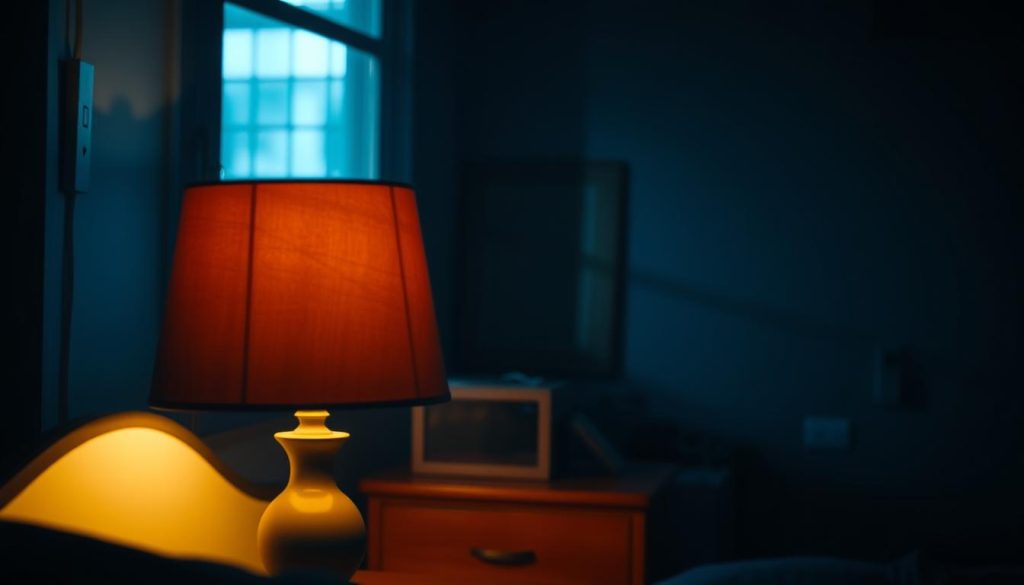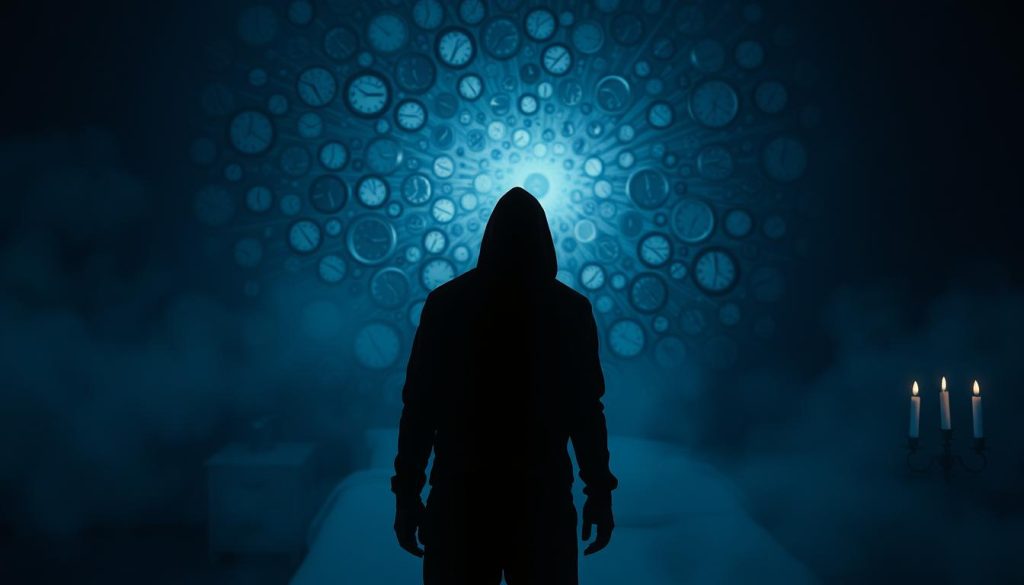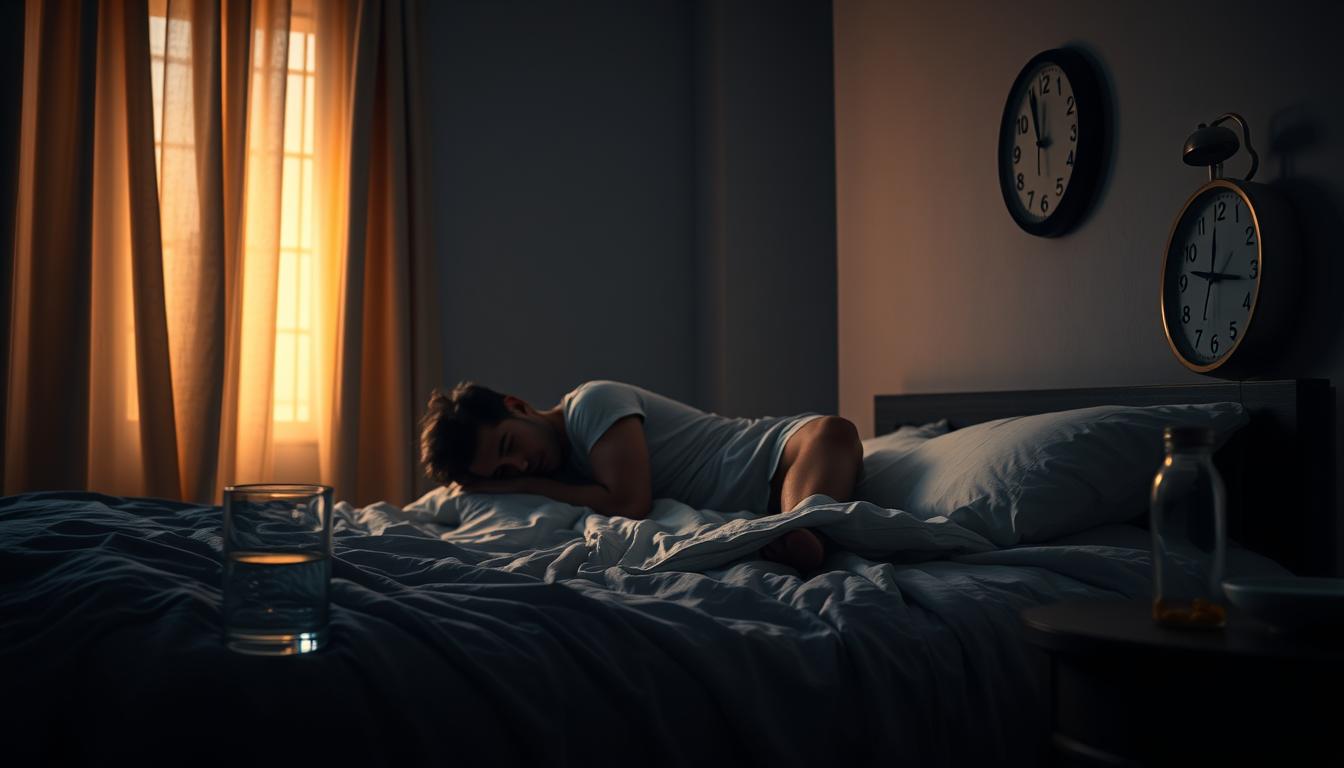Insomnia is a big problem, affecting millions of people. It messes with their sleep cycle and health. This article explores how sleep disorders and our body’s internal clock are connected.
Understanding the balance between these two is key. It can lead to better sleep and a healthier life.
Understanding Insomnia: A Common Sleep Disorder
Insomnia is a common sleep disorder that affects millions of people worldwide. It makes it hard to fall asleep or stay asleep all night. The American Academy of Sleep Medicine says about 30-35% of adults in the U.S. have brief insomnia symptoms. Chronic insomnia, lasting more than three months, affects nearly 10% of adults.
Insomnia’s symptoms include trouble falling asleep and waking up too early. These issues lead to poor sleep quality and overall sleep deprivation. People with insomnia often feel tired, moody, and have trouble concentrating.
Insomnia has many causes, including stress, anxiety, and depression. Physical issues like chronic pain and respiratory problems can also disrupt sleep. These factors can make it hard to sleep well.
Insomnia’s effects go beyond just feeling tired. It can make daily life harder and lower quality of life. Adults with insomnia may struggle at work, leading to less productivity and more absences. Chronic sleep loss is also linked to heart disease, obesity, and diabetes.
| Type of Insomnia | U.S. Adult Population Affected |
|---|---|
| Brief Symptoms | 30-35% |
| Chronic Insomnia | 10% |
What is Circadian Rhythm?
The circadian rhythm is a 24-hour cycle that controls many body functions. It mainly affects when we sleep and wake up. It also influences hormone release, eating times, and body temperature.
The Biological Clock

The biological clock is key to understanding circadian rhythms. It’s found in the hypothalamus, specifically in the suprachiasmatic nucleus (SCN). This part of the brain keeps our sleep-wake cycle in sync with light and darkness. Problems with this clock can cause sleep disorders and affect our health.
The Role of Light and Darkness
Light and darkness play a big role in keeping our circadian rhythm in check. Natural light during the day helps us stay on a regular sleep schedule. Darkness, on the other hand, triggers melatonin production, helping us sleep. But, artificial light, especially from screens, can mess with this natural process, making it hard to fall asleep.
The Connection Between Insomnia and Circadian Rhythm
Understanding the link between insomnia and circadian rhythm is key to better sleep. Both are important for good sleep habits. When one changes, it can affect the other, impacting our overall health.
How Disruptions Occur
Many things can disrupt our circadian rhythm, like odd work hours and too much artificial light. These changes mess with our body’s clock, making it hard to sleep well. This often leads to insomnia and tiredness during the day.
Impact on Overall Health
Long-term insomnia and rhythm disruptions can harm our health a lot. Studies show that not enough sleep can increase the risk of serious diseases. This includes obesity, diabetes, and heart disease. It shows how important it is to fix sleep problems.
Factors That Affect the Sleep-Wake Cycle
Many lifestyle choices can mess with our sleep patterns. Knowing what affects our sleep can help us live in sync with our body’s natural rhythm. This leads to better sleep health.
Work Schedules
Work that doesn’t follow a regular day-night schedule can harm our sleep. Our bodies are made to be awake during the day and sleep at night. Work that goes against this natural rhythm can cause sleep problems and tiredness. It’s key to have a consistent sleep routine for a healthy body clock.
Exposure to Artificial Light

Artificial light, like what comes from screens, can mess with our sleep hormone, melatonin. The blue light from screens can make our brains think it’s still daytime. To avoid this, try to limit screen time before bed and use blue light filters.
Travel and Jet Lag
Traveling to new time zones can mess with our sleep, known as jet lag. Our body’s clock stays on the old time, making it hard to adjust. Symptoms include trouble sleeping, feeling tired during the day, and trouble focusing. Planning sleep and light exposure before, during, and after travel can help adjust to the new time zone faster.
Melatonin Production and Sleep Quality
It’s important to know how melatonin affects sleep. Melatonin is a hormone made by the pineal gland. It helps control when we sleep and wake up. When it’s dark, melatonin levels go up, telling our body it’s time to rest.
The Role of Melatonin
Melatonin helps keep our body’s clock in sync. When it works right, we sleep better. But, if it’s off, we might have trouble sleeping, like insomnia. This shows how crucial melatonin is for good sleep.
How to Boost Melatonin Naturally
There are ways to naturally increase melatonin. Here are some good ones:
- Light Exposure: Stay away from bright lights before bed. Use dark curtains and sleep masks to make your room dark. This helps your body make more melatonin.
- Dietary Choices: Eat foods like cherries, almonds, and bananas. They help make more melatonin.
- Consistent Sleep Schedule: Sleep at the same time every day. This helps your body make melatonin better, leading to better sleep.
By using these tips, you can naturally increase melatonin and sleep better.
Sleep Patterns: How They Develop and Change
Sleep patterns change a lot over our lives. They adapt to changes in lifestyle, hormones, and our natural sleep cycle.
Infants sleep in short, frequent cycles. This is because their sleep cycle is still developing and they need to eat often. As kids grow, their sleep gets more regular. They start sleeping through the night and have a set bedtime.
Teenagers experience a big change in sleep patterns. Hormonal changes, especially the release of melatonin, make them want to stay up late. This can lead to trouble sleeping early for school.
Grown-ups usually aim for 7-9 hours of sleep each night. But, work, stress, and lifestyle can affect how well and when we sleep.
Older adults often sleep earlier and wake up earlier. Their sleep can be broken up. This is due to changes in their sleep cycle and less melatonin.
Changes in sleep patterns are a natural part of life. They are influenced by biology and our environment. Knowing about these changes can help us take care of our sleep at every stage of life.
Causes of Sleep Deprivation
It’s important to know why we don’t get enough sleep. Both our minds and bodies can cause sleep problems. These issues affect our health and happiness.
Psychological Factors
Stress and anxiety often keep us awake. The National Sleep Foundation says 50% of insomnia is due to these feelings. Depression can also mess with our sleep, making it hard to stay asleep or wake up too early.
Physical Health Conditions
Some health problems can also disrupt our sleep. Sleep apnea, for example, stops breathing during sleep. Chronic pain from arthritis or fibromyalgia can make it hard to sleep well. These issues make it tough to get good sleep.
| Sleep Deprivation Causes | Psychological Impact | Physical Health Conditions |
|---|---|---|
| Stress | Increased anxiety and difficulty falling asleep | Frequent waking due to stress-related hormonal imbalances |
| Depression | Prolonged insomnia or excessive sleepiness | Fatigue and lack of energy during the day |
| Chronic Pain | Psychological distress leading to sleep difficulties | Interrupted sleep and inability to find comfortable sleeping positions |
| Sleep Apnea | Increased stress and anxiety | Repeated breathing interruptions affecting sleep quality |
Effective Strategies to Combat Insomnia
Struggling to sleep well can be really tough and hurt your health. A few simple steps can help fight insomnia and improve your sleep.

Create a Consistent Sleep Schedule
Having a regular sleep schedule is key to keeping your body’s clock in sync. Going to bed and waking up at the same time every day helps. This makes it easier to fall asleep and feel refreshed in the morning.
This routine tells your body when it’s time to sleep. It’s a smart way to beat insomnia by setting a clear sleep pattern.
Limit Screen Time Before Bed
Looking at screens before bed can mess up your sleep cycle. The blue light from phones and computers stops your body from making melatonin. This makes it hard to fall asleep.
Try to avoid screens for at least an hour before bed. Instead, do something calming like reading or meditating. This helps your mind and body get ready for sleep.
Here’s how sticking to a sleep schedule and avoiding screens can help your sleep:
| Strategy | Benefits |
|---|---|
| Create a Consistent Sleep Schedule | Regulates internal clock, improves ability to fall asleep, ensures waking up refreshed. |
| Limit Screen Time | Boosts melatonin production, reduces bedtime distractions, promotes natural sleep onset. |
The Importance of Good Sleep Hygiene
Good sleep hygiene is key for quality rest and well-being. A consistent bedtime routine tells your body it’s time to sleep. Experts say a regular sleep schedule and a calm pre-sleep space boost sleep quality.
A good bedtime routine might include reading, a warm bath, or mindfulness. It’s important to keep your sleep area cool and comfy. Also, avoiding blue light from screens before bed helps a lot.
These habits not only make sleep better but also health. By focusing on sleep hygiene, you wake up feeling fresh and ready for the day.
| Best Practices | Benefits |
|---|---|
| Maintain a regular sleep schedule | Consistent sleep patterns |
| Create a relaxing bedtime routine | Easier transition to sleep |
| Limit screen time before bed | Reduced disruptions |
| Keep a comfortable sleep environment | Improved sleep quality |
Natural Remedies to Improve Sleep
Looking for ways to sleep better? Natural sleep remedies are a great place to start. Many people find herbal supplements and relaxation techniques helpful. They can improve sleep quality and overall health.
Herbal Supplements
Herbal supplements like valerian root, chamomile, and lavender are known for their sleep benefits. You can find them in teas, capsules, and tinctures. A study in the Journal of Clinical Sleep Medicine showed valerian root helps sleep better.
Chamomile and lavender are calming. Herbalists often suggest them to ease anxiety and help relax before bed.
Relaxation Techniques
Relaxation techniques can also fight insomnia and improve sleep. Activities like meditation, deep breathing, and progressive muscle relaxation calm the mind and body. The American Academy of Sleep Medicine says these can make sleep better.
Meditation apps and guided sleep meditations are easy to find. They help people add relaxation techniques to their bedtime routine.
Using herbal supplements and relaxation techniques together can help a lot. This way, people can use natural sleep remedies to sleep better and feel refreshed.
When to Seek Professional Help for Sleep Disturbances
Knowing when to get help for sleep problems is key to staying healthy. Sometimes, trouble sleeping is just a one-off. But if it keeps happening, it might mean there’s a bigger issue. If you’ve tried many ways to sleep better and still can’t, it’s time to see a sleep specialist.
Watching how you sleep can show when you need help. If you always wake up tired, have bad dreams, or have trouble breathing while sleeping, see a doctor. Sleep experts can find and fix sleep disorders with new tools and methods.
Sleep doctors offer many treatments, like therapy for insomnia or machines for sleep apnea. New tech, like sleep trackers and glasses that block blue light, helps patients sleep better. The American Academy of Sleep Medicine says seeing a doctor is a good idea if sleep problems last more than three weeks.
Getting help for sleep issues is a big step towards feeling better. It can stop sleep problems from getting worse and make your life better. A sleep specialist can help with stress, medicine, or changes in your life to fit your needs. Don’t wait to find a qualified doctor for the best care.

